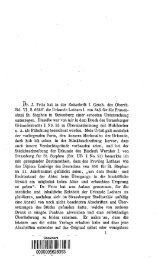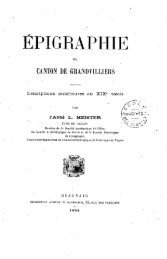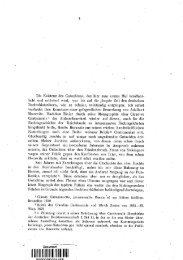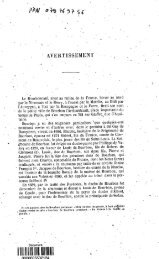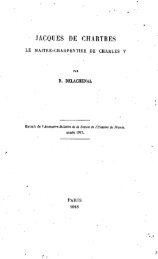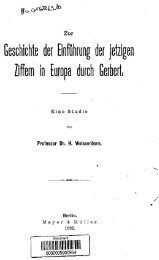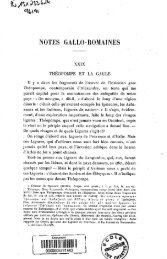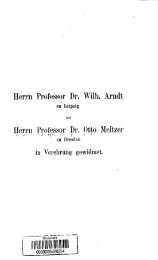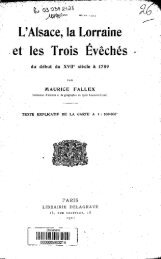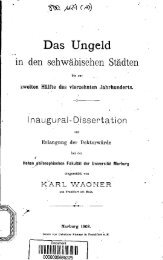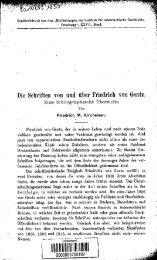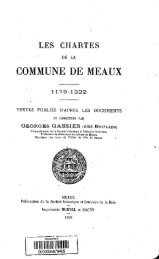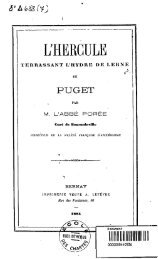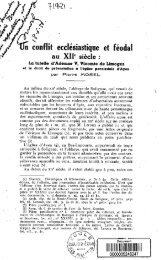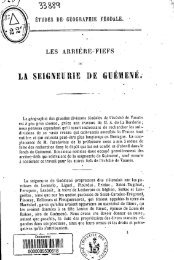4P Li gç(' TRANSACTIONS
4P Li gç(' TRANSACTIONS
4P Li gç(' TRANSACTIONS
You also want an ePaper? Increase the reach of your titles
YUMPU automatically turns print PDFs into web optimized ePapers that Google loves.
788 LE LIVRE l)E YCONOMIQUE D'ARISTOTE [TRANS. AMER. PHIL. Soc.<br />
ham's translation is referred to as rcccns-io Dtrandi and<br />
the fourteenth century version is called vet us trans1atio,'<br />
since Lacombe, alone among modern scholars, judged<br />
the Latin version in three Books to he older than William's<br />
version of the first and third Books. It is clear<br />
that Lacombe did not utilize the investigations of Mandonnet,<br />
although the latter's articles are included in the<br />
list of works consulted; nor does he include the Arahico-<br />
Latin summaries ']it list of Latin texts.<br />
As the many variant readings recorded in Susemihi's<br />
edition indicate, 13 considerable textual divergencies exist<br />
among the manuscript copies belonging to each of the<br />
two families of Greco-Latin versions of the Economics.<br />
There is, moreover, a copy of a Latin commentary on the<br />
Economics by Ferrandus de Hispania, made about 1310,<br />
which contains in its margins portions of textual passages<br />
that point to the existence of a third independent<br />
Latin version of which nothing definite is known.<br />
Suscnnhl deemed these marginal notes sufficiently important<br />
to include portions of them in his variant readings<br />
for the third Book; indubitably, they do serve to<br />
clarify several doubtful passages. The source from<br />
which these marginal excerpts were derived remains<br />
unsolved.<br />
This general survey of the various Latin translations<br />
of the Economics available in the fourteenth century may<br />
serve to underscore the difficulties confronting anyone<br />
who might wish to undertake the task of turning this<br />
work into a modern language. Certainly it would have<br />
been much simpler to work from a Greek original; but in<br />
fourteenth-century France knowledge of Greek was at<br />
its nadir and the author of Le <strong>Li</strong>vrc dc Yconomiquc had<br />
no other recourse than to utilize the available Latin<br />
versions. Our examination of his French translation<br />
will demonstrate that he had at his disposal recensions<br />
of the Latin versions of the Economics that have since<br />
disappeared. However, these additional textual resources<br />
were of little use to him. Often he complains<br />
in his glosses that his originals are corrupt and defy<br />
intelligent interpretation. Modern translators of this<br />
treatise have echoed his complaint and have found the<br />
Greek original equally troublesome. His struggle to<br />
Georges Laconibe, Arislo/cics !utijzus 1: 166-167, Rome,<br />
<strong>Li</strong>breria dello Stato, 1939. Lacombe states, p. 77: "Nos autem<br />
commentationes magni momcnti expectaimis quas preparant d.<br />
Pctrus Mandonnet et Ilirkenmajer, quisque sua pro parte.<br />
inlerduns silcamus." The fact that this distinguished work was<br />
published posthumously doubtless accounts for the confusion.<br />
13 Susemihl published Book I of the Latin version of William<br />
of Moerbeke separately: Occononiicoru,n, quac Arstote/i vu/go<br />
tribuun/ur, libri /irind re/usia trans/u/jo Latina, 7 pp., Berlin,<br />
1870, with variant readings from three manuscripts. Book Ill<br />
is found in his Aristotelis quac feruniur Occonoinica, 40-63,<br />
Leipzig, Teubner, 1887, with variants from eight manuscripts and<br />
also the anonymous Latin version of ca. 1310 and the Scholia<br />
of Ferrandus de Hispania. For convenience in comparing William's<br />
version with Oresme's French translation, we have included<br />
Susemihl's reconstructed text, minus the variant notes,<br />
in the Appendix to this edition of the I ' 'iw inquc. I ''' pp<br />
extricate the sense from doubtful passages was not<br />
uniformly successful and his working methods were<br />
quite elementary ; nevertheless, in making the attempt,<br />
he produced one of the earliest examples of textual<br />
criticism in a modern language.<br />
For ready reference, the following summary of the<br />
Mediaeval Latin versions of the Economics will be<br />
helpful<br />
SUMMARY OF MEDIAEVAL LATIN VERSIONS<br />
OF THE ECONOMICS<br />
(1) Translation from Arabic of Averrhoes' synoptic<br />
paraphrase, made by Pedro Gallego, bishop of Cartagena,<br />
ca. 1260.<br />
(2) Translation of same Arabic synopsis, made by<br />
Armengaud Blazius for Pope Clement V. Ca. 1310.<br />
There is no textual evidence that either of these<br />
Arabico-Latin versions was used in connection with Le<br />
<strong>Li</strong>vrc de Yconomique.<br />
(3) William of Moerbeke's translation of Books I and<br />
III front Greek original. 1267. The two Books are<br />
uniformly numbered I and II.<br />
(4) Aiiorivmous translation of Books 1, II, and III<br />
from Greek original, ca. 1310.<br />
(5) Excerpts from anonymous Greco- I .atin translatiofl,<br />
now lust, of Books I an(l III. Contained in<br />
marginal and interlinear scholia in Commentary on the<br />
Economics by Fcrrandus de Hispania, Ca. 1310.<br />
Following the precedent of (3) above. Le <strong>Li</strong>vre de<br />
Yconomquc omits entirely the second Book of the Greek<br />
text nor is there any hint of its existence in either Greek<br />
or I.atiti. Further reference to this excluded second<br />
Book will not be required in our present stud y. We are<br />
here concerned onl y with Books I and III of the original<br />
Greek Economics. For convenience," we shall adopt<br />
henceforth the numbering found ill the French version.<br />
Thus<br />
<strong>Li</strong>vre I hcak I of both the Greek and I .atin texts.<br />
I .ivre II Book II of William of Moerbeke's Latin<br />
version; Book III of the anon ymous Latin text and<br />
presumably Book III, now host, of the Greek original.<br />
IV. LE LIVRE DR YCONOMIQUE<br />
1. THE TRANSLATOR, NICOLE ORESME<br />
The intellectual climate of Europe in the fourteenth<br />
century stands in marked contrast to that of the two<br />
preceding centuries. During the twelfth and thirteenth<br />
centuries the vast structure of mediaeval Christian<br />
The Loeb Classical <strong>Li</strong>brary edition of the Os'cono,nica, 321-<br />
424, Harvard Univ. Press, 1935, contains the Greek text of<br />
Books I and II and the William of Mocrbeke version of Book<br />
III as established by Susemihl iii the Teubncr edition, with a<br />
parallel English translation by Cyril Armstrong. This Loeb<br />
edition is to he recommended for its convenient format and the<br />
excellence of the En glish translation.



